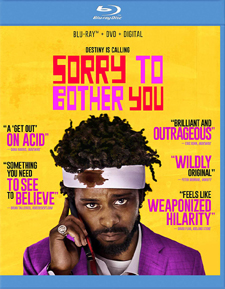Sorry to Bother You (Blu-ray Review)

Director
Boots RileyRelease Date(s)
2018 (October 23, 2018)Studio(s)
Annapurna Pictures (20th Century Fox)- Film/Program Grade: B
- Video Grade: A
- Audio Grade: A
- Extras Grade: B+
Review
Sorry to Bother You combines offbeat comedy with social commentary. Working hard to make ends meet, Cassius “Cash” Green (Lakeith Stanfield, Get Out), a struggling 30-something who lives in his uncle’s garage, takes a telemarketing job. A co-worker gives him a magical key to business success: adopting a “white voice” (provided by David Cross) will quickly win over customers and give him a boost up the corporate ladder. Cassius’ girlfriend, a performance artist named Detroit (Tessa Thompson, Creed) is an activist who vandalizes billboards at night. This satirical look at racism, class, and capitalism in modern America co-stars Armie Hammer as an egomaniacal CEO and Danny Glover as Cassius’ older and wiser co-worker.
When the workers at Cash’s company, RegalView, want to organize a union, he’s enthusiastic, but as he advances in the company and his lifestyle changes for the better, he feels conflicted about confronting upper management. The film feels both implausible and real in terms of America’s present socio-economic condition. Cash can only find success by suppressing his true self and conforming to the “correct” way to speak in a business situation.
Stanfield turns in a first-rate performance as Cash. He shows the changes in Cash’s character by bodily language, expression, and a layered performance. His Cash isn’t a one-note cliché, but a complex character beset by inner turmoil as his fortunes alter. As his girlfriend Detroit, a free-spirited artist and Cash’s social conscious, Ms. Thompson plays the role as a no-nonsense young woman and the voice against selling out to greed and complicity in the sins of big business. Not exactly an innocent, Detroit represents incorruptible decency while remaining grounded in the realities of life.
Sorry to Bother You is clever but its comedy is inconsistent, with some gags hitting the mark and others languishing. It addresses issues that haven’t been explored much in movies, keeping the tone light while underscoring the cultural biases behind the reality that the chances of advancing at work are tied to the employee’s look, sound, and manner.
Director Boots Riley has fashioned a quirky picture that whimsically addresses both social conventions while satirically criticizing them. This is not a lecture-heavy diatribe. It sails along with unforeseen twists and turns, always several steps ahead of the viewer. In fact, the film veers into surrealistic territory in its third act.
Visual quality is sharp, with a nicely balanced color palette. Aspect ratio is 2.40:1. Sound is crystal clear and the track is not over-orchestrated, with silences often increasing the impact of key scenes. Audio is English 5.1 DTS-HD. Optional English and Spanish subtitles are available. Running time is 100 minutes.
Bonus materials on the 2-Disc Blu-ray/DVD Combo Pack include the featurette Beautiful Clutter With Boots Riley, director commentary, The Art of the White Voice short film, the featurette The Cast of Sorry to Bother You, and photo gallery. A digital copy is enclosed.
Beautiful Clutter With Director Boots Riley – This 12-minute featurette contains interviews with the director who discusses his filmmaking style, what attracted him to the project, the themes he blends with comedy, and their relationship to the real world.
The Art of the White Voice – This short film addresses the key scene that triggers the plot – Cash’s fellow telemarketing co-worker Langston (Danny Glover) giving him a tip about using a white voice on the telephone to get more productive results.
The Cast of Sorry to Bother You – Lakeith Stanfield and Tessa Thompson discuss how they approached their roles and offer their opinions about the film’s ability to imbed social insight into a surreal comedy.
Director commentary – Boots Riley goes into considerable detail about specific scenes, artistic decisions, casting the leads, the unorthodox screenplay, and how he prepared, and gives anecdotes about individual scenes. Unlike the bland commentaries by other directors on some Blu-ray releases, Riley actually sounds enthusiastic and eager to share his expertise.
– Dennis Seuling

